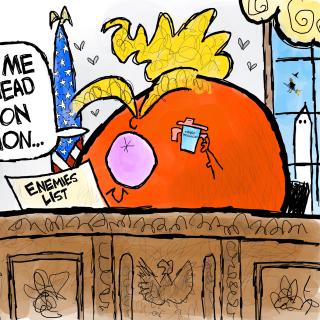Advertisement
As the midterm election heats up in Ohio, it’s time to recognize the important role minor political parties play in our bellwether state, as well as across the nation. Although commonly referred to as third parties or alternative parties, the ideas behind these groups are popular and can have a major impact in the future of our nation’s political landscape as the millennial generation continues to look for its voice.
For example, in my personal experience I always considered myself a Democrat -- I turned 18 in August 2001 and was an adult for one month before we entered a post-9/11 world. During my formative college years I quickly grew to resent the Bush administration and their war mongering, socially conservative, anti-civil liberty agenda. But as the Democrats eventually took power in 2008, I started to realize that they had a similar corporate, anti-populist agenda that differed from my own and I looked elsewhere for where exactly I fit in. I took my political activism seriously and knew that my generation had a lot of work to do to make a difference in the future we were inheriting.
While I voted for the Green Party presidential candidate in 2008, I was also inspired at that time by an anti-establishment congressman named Ron Paul, a Republican from Texas. In a GOP presidential debate in May 2007, Paul openly argued with his fellow Republicans about the impact of the United States’ military-driven foreign policy and how our country created the terrorism problem in the Middle East that winded up attacking us on 9/11. Until then, I had never heard a Republican speak so intelligently and logically about the post 9/11 world that I came up in, and how our war-focused military policy had not only created the problem, but was making us less safe with its so-called “solution.” Obviously, I asked some friends about Paul and the exact “Republican” views he represented, and I was told that he was a Libertarian. I admittedly had no idea what that was in 2007, but after some quick research on the Internet, I found that with its anti-war, pro-civil liberty positions that had once made me a Democrat, there was a new political home for me with the Libertarians.
Now, for any progressives who may be quick to disagree with or criticize the Libertarian Party, I typically point out that Libertarians have stood for their anti-war principles since 1971, long before I was born. These are policies that Libertarians have advocated for and progressives can agree with, in addition to the idea of protecting individual freedoms that are typically considered “liberal” when it comes to drug use, women’s rights and gay rights. Furthermore, regarding foreign and domestic policies in Congress, I take great solace in knowing that libertarian-leaning Republican congressmen like Justin Amash from Michigan and Thomas Massie from Kentucky frequently work with progressive Democrats like Tulsi Gabbard from Hawaii and Jared Polis from Colorado on issues ranging from defunding the NSA to opposing war in Syria to reforming federal marijuana laws. This holy alliance of libertarians and progressives agreeing on core issues like these is what will bring political cultures together, end legislative stalemates and propel the millennial generation into creating a government that they can be proud of and believe in, whether it’s through major or minor political parties.
For example, just look at how millennials resonated to the presidential campaigns of Paul in 2008 as well as Bernie Sanders in 2016, and how Ohio’s political climate is proving to again be the same type of prototype as our bellwether state typically does during these important times. The primaries for governor in Ohio alone pitted a progressive against a moderate in the Democratic race and a Trump supporter versus another moderate in the Republican race. This is the new normal with the major two political parties, but again, this is what will make minor parties like the Greens and Libertarians so attractive to new millennial voters. Ohio was one of the most important states to go for Trump by roughly eight points, a margin that no one can point to and blame on third parties, as the Green Party candidate Jill Stein only garnered one percent and the Libertarian Party candidate Gary Johnson got three percent. But despite these small numbers and the ridiculous blame game pushed against minor parties in 2016, this only means that plenty of people are seeking an alternative to the two party system. This type of voting should continue to be encouraged as the millennial generation surges into political power in the future and the new tireless minority slowly becomes the majority. After all, if we don’t include more choices and voices in our political process, we’ll continue to end up with the same old thing.



